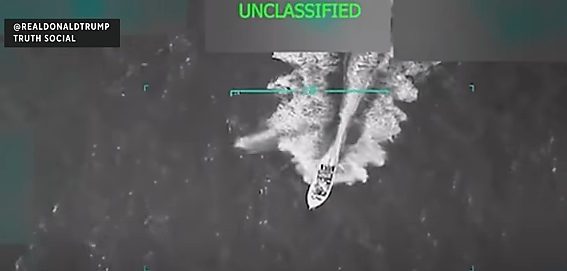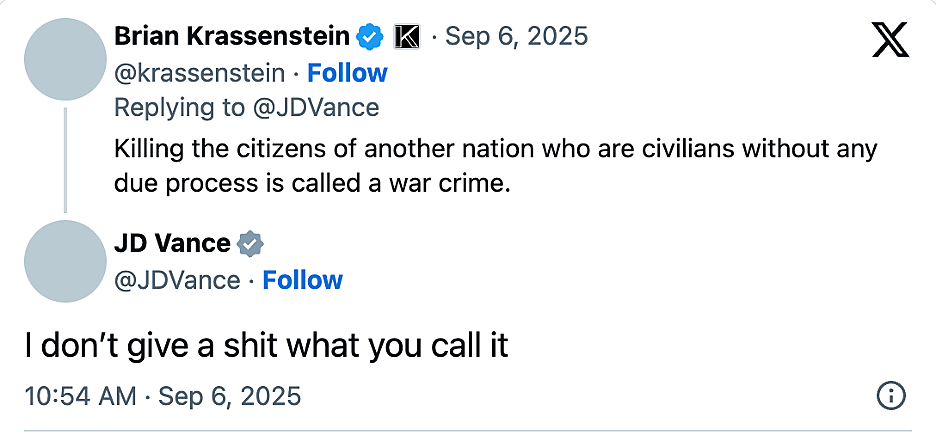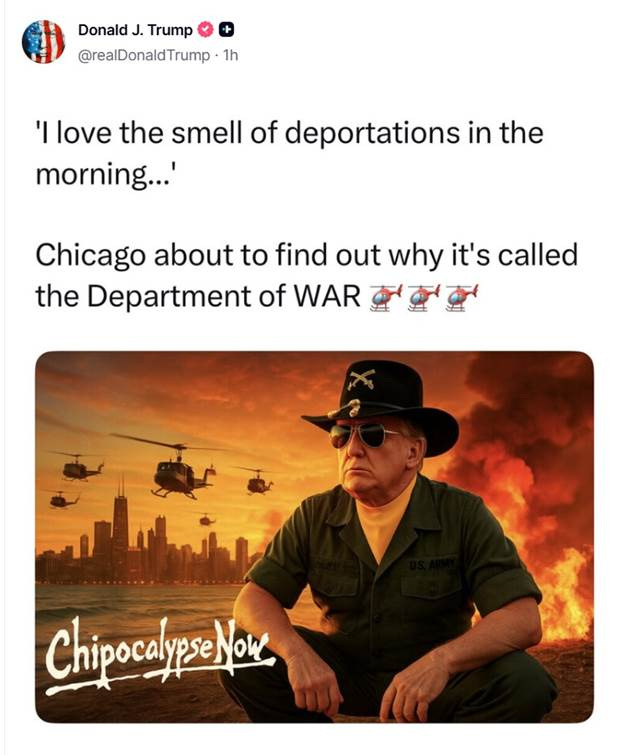Presidents Should Not Have a License to Kill
Free societies do not replace civilian criminal law with killing.
President Trump once quipped, “I could stand in the middle of Fifth Avenue and shoot somebody, and I wouldn't lose any voters.” Well, he wasn’t standing in the middle of Fifth Avenue, but he nonetheless tested the limits of his ability to get away with extrajudicial execution this week by personally ordering the deaths of eleven people in a boat off the coast of Venezuela. This was an impeachable, immoral crime.
Officials told several media outlets that the boat had already turned around to go back to Venezuela before the military attacked it. As significantly, the full video shows “the military making repeated strikes on the vessel even after disabling it” and that it “was hit several times until there was no movement on board.” In other words, it is now clear that the orders were not merely to use military force to stop this boat, but to kill all the occupants, leaving no witnesses. On Monday, he conducted another strike, killing three more people.
The administration claims that this is a “war” because that’s the only possible way to justify an extrajudicial killing. But the fact that it has defined the “combatants” in this war as accused civilian drug criminals gives away the reality: the government just militarized what was, at most, a low-level criminal law enforcement incident outside the United States. Free societies do not replace civilian criminal law with killing simply because killing is easier for the government.
Once we consider the victims’ supposed crimes, we can see that it was the government that committed the truly egregious crime here.
1. Drug smuggling is not a capital crime. Even if we suppose the victims were guilty, they did not deserve fiery incineration. That’s not just the moral view. That’s the view of US law. People—citizens or noncitizens—who possess illegal drugs cannot legally be killed even after being convicted after a trial, let alone by presidential dictates. People who possess drugs cannot be shot by law enforcement because drug possession is a nonviolent offense for which the penalty is incarceration for a period determined by a judge. A federal appeals court also recently found that drug smuggling does not constitute an “invasion” that would justify a military response. When police kill criminal suspects who are not actively threatening violence against others, it is murder. Ask former officer Derek Chauvin, who asphyxiated George Floyd.
Even Trump admits that drug crimes are not worthy of death. He has pardoned drug traffickers and kingpins—even some with violent histories—and signed a law that permitted early release for drug offenders during his first term.
2. No government should be trusted to kill criminal suspects in any context. People accused of crimes should be arrested and tried in a court of law. Free societies give due process to the worst criminals, even mass murderers. A policy whereby presidents can bomb foreigners by just saying they are drug dealers will cause the deaths of completely innocent people. The fact that police so routinely raid innocent homeowners looking for drugs cautions against a kill-first policy, and that’s inside the United States with judge-approved warrants supported by probable cause.
3. No government should be trusted to kill suspects in this context specifically. It is even more difficult to determine guilt or innocence using remote surveillance. Indeed, the United States already knows that this type of policy gets innocent people killed because, in 2001, the CIA covertly helped Peru shoot down a suspected drug smuggling plane—only for it to turn out to be full of US citizens, and not just any US citizens, but a US missionary and his infant daughter. This was the end to the secret, deadly collaboration with Peru.
4. The Trump administration in particular cannot be trusted. It has repeatedly proven its willingness to accept the flimsiest “evidence” against suspected Venezuelan gang members. It sent hundreds of Venezuelans to a Salvadoran prison because they were illegal alien “terrorists.”
As I have documented, it lied about them all being “illegal aliens”—more than 50 entered legally—and they used images taken of random tattoos from random Instagram accounts around the world to train officers to identify Tren de Aragua (TdA) tattoos.
The administration accepted the opinion of a former Milwaukee police officer who was such a liar that he was put on a list of cops ineligible to testify when he wrongly identified a gay makeup artist as a TdA member based on his tattoos. The tattoos said “Mom” and “Dad.”
The government listed a former professional soccer player as a gang member because of a tattoo of the Real Madrid logo—and sent him to a foreign prison without a trial.
· In one of the only cases to get in front of a judge, the government accused a Venezuelan woman of being a senior member of TdA, but the judge who heard her habeas petition stated the government was “wasting judicial resources” because “it has no evidence.”
· After it admitted to wrongfully deporting him, the administration accused Kilmar Abrego Garcia of being an MS-13 member and fired a prosecutor for refusing to call him a “leader” of MS-13. But again, when a judge saw the evidence of his membership, he said, “Such conclusion would border on fanciful.”
· The government is lying constantly. It lied about not racially profiling before explicitly asking the Supreme Court to allow racial profiling. Just last week, it lied in an effort to illegally deport a group of Guatemalan children by claiming they and their parents wanted their return.
· In numerous cases, the government has indicted individuals claiming that they assaulted or threatened officials, only for grand juries to vote not to indict, and these cases have exposed lies that led to the charges in the first place. This is precisely why due process exists.
5. This government cannot be trusted in this specific case. In his initial post, President Trump stated that the boat was “heading to the United States.” But Secretary of State Marco Rubio said: “These particular drugs were probably headed to Trinidad or some other country in the Caribbean.” Reporters in Venezuela appear to have confirmed this version. For context, Trinidad is just seven miles from Venezuela—nowhere close to the United States. This means that the boat had barely exited Venezuelan waters when Trump determined it was an “imminent threat” to the United States. The government also has not even established what drugs were on board. At his press conference, Rubio has only described the situation as “a boat full of cocaine or fentanyl or whatever,” while Secretary of Defense Pete Hegseth said they knew “exactly who they were and what they were doing.” The administration’s briefing of Congress provided no evidence that the people were gang members or that there were drugs on board, according to Sen. Jack Reed of Rhode Island.
6. The administration’s justifications are dangerous and absurd.
· The first basis offered by Secretary Rubio was that even if not traveling to the United States, a boat off the coast of Venezuela was “an imminent threat” to the United States solely because a controlled substance was on board. The idea that possession or transport of these items represents an “imminent” threat to others such that it would justify killing the transporter requires a fanciful imagination. Cocaine doesn’t randomly fly up people’s noses. Drug possession anywhere (let alone hundreds of miles away) is the antithesis of an “imminent threat,” and it is not even a non-imminent threat to people who don’t ingest illicit narcotics.
· Rubio’s second explanation is: “The United States has long – for many, many years – established intelligence that allow us to interdict and stop drug boats, and we did that. And it doesn’t work… [so] instead of interdicting it, on the President’s orders, he blew it up.” If they could have interdicted it, that would completely repudiate the claim that this specific vessel was an “imminent” threat, which is all that would be relevant. The alleged ineffectiveness of the penalties for drug trafficking does not empower the president to unilaterally make the penalty incineration. Even if he had that power, it would be immoral to kill people who are not actively threatening violence against anyone else.
· Rubio’s last justification is: “Frankly, it is a war.” But it is not a war, and even if it were a war, intentionally killing civilians would still be a crime. “I would call it a war crime, except that there is no war here,” writes Cato’s Ilya Somin. “So really it's just an old-fashioned regular crime.” It is both wrong and dangerous for any president to assume the power to kill people on his own authority. The Constitution reserves war powers to Congress specifically because it did not want the president to have the power to start wars on his own and evade the constitutional limits on power. When asked for the legal authority, Vice President JD Vance couldn’t even think of an answer. He was more direct when asked if it would be a war crime:
7. Americans are threatened. As I’ve written, most convicted drug traffickers crossing US borders are actually US citizens. How long before this administration or the next orders the US military to kill them? More than one million people per year are arrested for flouting the government’s controlled substance laws, and tens of millions more violate them every single year. Of course, there is no suggestion that they yet plan to kill drug suspects domestically, but there is nothing in their logic for this decision that would prohibit it, and with the military now deployed throughout the United States with the goal of stopping crime, the soldiers stand ready and willing to take orders from the “Department of War.”
Like so much about this administration’s agenda, including his deployment of US troops in US cities, the real motivation for this strike is likely immigration enforcement, not drugs or crime. It remains possible that this strike was on a human smuggling boat, given that the number of persons on board was excessive for a drug run. Moreover, the strike came just hours after the more conservative-leaning Fifth Circuit Court of Appeals found that drug smuggling “is not within even an updated meaning of invasion or predatory incursion” under the Alien Enemies Act (AEA). The AEA would permit the deportation of Venezuelans—including legal immigrants—without the normal procedural protections.
In explaining his decision for the strike, the president spent most of his time explaining how horrible Venezuelan immigration has been, spreading his usual lies about Venezuelans being “some of the worst people anywhere in the world.” This strike is the culmination of a decade-long campaign by the president and his advisors to dehumanize foreigners and obliterate their rights wherever they are. James Madison presciently warned us where this path of stripping noncitizens of their due process ends:
If aliens had no rights under the Constitution, they might not only be banished, but even capitally punished, without a jury or the other incidents to a fair trial. … on mere suspicion, by the single will of the executive magistrate.
Now it’s happening. We must respond as Thomas Jefferson responded to attacks on the constitutional rights of foreigners in those days.
the friendless alien has indeed been selected as the safest subject of a first experiment [in tyranny] but the citizen will soon follow… In questions of power then let no more be heard of confidence in man, but bind him down from mischief by the chains of the Constitution.
Congress should regain control of the US military and prevent further attacks or escalation into an actual war with Venezuela.






Then there's this...
Venezuela plays virtually no role in the fentanyl trade.
Fentanyl is almost entirely produced in Mexico with chemicals imported from China, according to the U.S. Drug Enforcement Administration, the Justice Department and the Congressional Research Service. Mexico is close to the U.S. market, and Mexican cartels already control many fentanyl smuggling routes.
https://www.nytimes.com/2025/09/03/world/americas/venezuela-drug-boat-trump-us.html